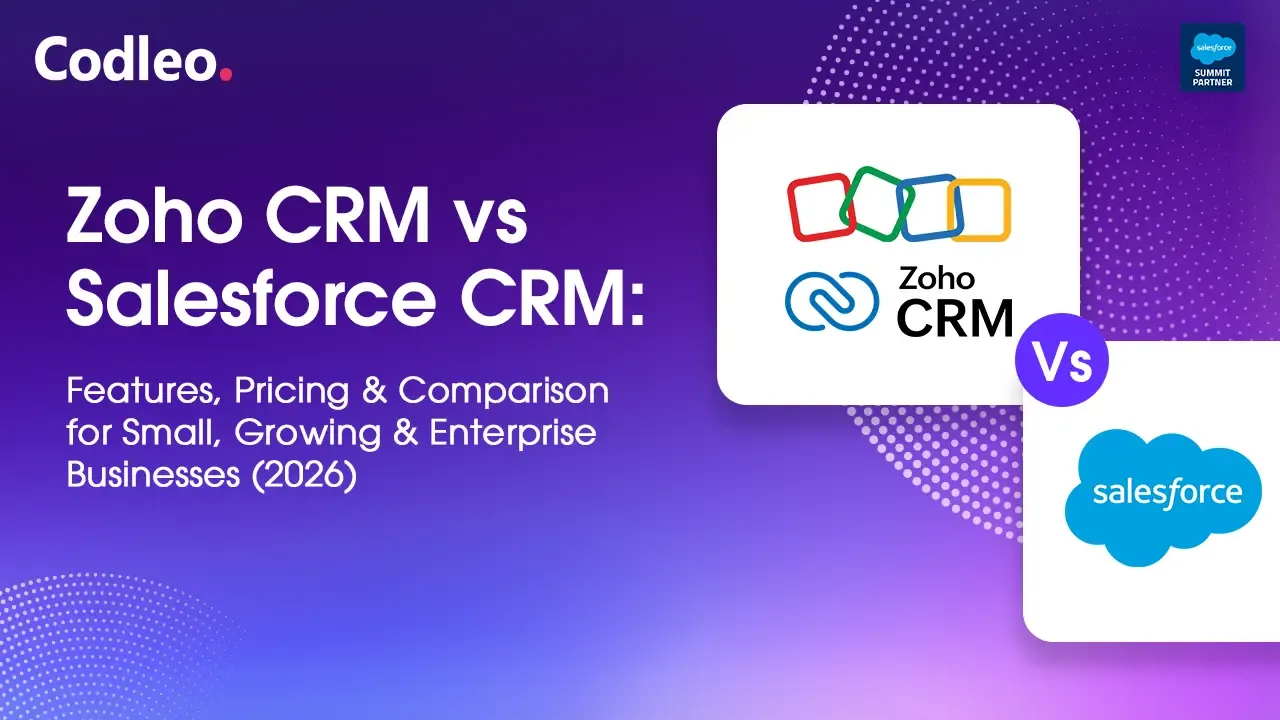
The Ultimate Guide For Salesforce Financial Services Cloud Implementation

Imagine walking into a bank where you're immediately welcomed by a friendly representative who knows your name and understands your financial goals perfectly. Within moments, they access your information, listen to your needs, and offer an insightful solution.
“This is a far superior experience compared to what I'd get elsewhere,” you might think.
Now, envision this level of personalized and efficient service being extended to every customer who enters the bank. The secret behind this exceptional experience? It’s all made possible by Salesforce Financial Services Cloud.
Today’s customers expect seamless digital interactions, personalized advice, and innovative tools that empower them to make informed financial decisions. This is especially true when it comes to managing their finances.
So, how can your financial institution keep up with these changing expectations and deliver the outstanding service your customers deserve?
The answer lies in Salesforce Financial Services Cloud. This guide will show you how its capabilities can help financial service providers overcome challenges and elevate customer experiences.
Ready to learn more? Let’s dive in.
What is Salesforce Financial Services Cloud?
Salesforce Financial Services Cloud is a cloud-based platform tailored specifically for financial service providers, offering another exceptional solution from Salesforce. It provides an integrated and customizable platform suitable for various types of financial institutions.
With powerful customer relationship management tools, the Financial Services Cloud allows businesses to gain a deeper understanding of their customers and deliver highly personalized experiences.
Focusing on regulatory compliance and security, this platform ensures that financial organizations adhere to industry regulations and protect sensitive financial data.
Why Salesforce Financial Services Cloud?
1. Digital Transformation:
Open the app, scan the QR code, and pay – that's the simplicity brought by digital transformation in the financial sector. Technologies such as blockchain, artificial intelligence (AI), mobile banking, chatbots, and AI-powered recommendations have exceeded customer expectations.
These advancements have revolutionized operations and customer interactions, enhancing convenience and accessibility for those affiliated with financial institutions. Additionally, cross-platform data integration and automation have paved the way for increased efficiency and a reduction in errors.
2. Data analytics and AI:
The days when banks relied solely on intuition and experience are long gone. By harnessing AI to process vast amounts of data and deliver advanced analytics, financial institutions can predict spending habits, identify future trends, and provide personalized financial advice.
For instance, a bank could analyze your spending data and recommend a budgeting tool or a savings plan tailored to your financial goals.
3. Open Banking:
With the ability for customers to securely share their financial information with third-party providers via APIs, there’s no need to juggle multiple banks to compare investment options.
Open banking grants customers access to innovative financial products and services beyond traditional institutions. It promotes collaboration and innovation, fostering a more competitive market that benefits consumers. For example, DBS Bank in Singapore utilizes AI to analyze transaction patterns and detect potential fraud, preventing losses of over $100 million in 2023.
4. Personalized Financial Experiences:
Imagine logging into your banking app and receiving personalized advice based on your financial goals. This is now a reality, thanks to AI and data analytics. These technologies assess your spending habits, risk tolerance, and income to suggest customized investment options. They also tailor financial plans and recommend products that best align with your current financial status.
This move towards personalized experiences empowers customers to take control of their finances while increasing engagement and loyalty for financial institutions.
5. Cybersecurity and Data Privacy:
Bank of America recently invested $1 billion to bolster its cybersecurity initiatives, protect data, and prevent cyberattacks. This significant investment underscores the importance banks place on implementing robust security measures to safeguard sensitive information and maintain trust. Financial Services Cloud is designed to comply with data privacy regulations, such as GDPR and CCPA, to ensure the protection of customer data.
Who is Salesforce Financial Services Cloud For?
Salesforce Financial Services Cloud meets the diverse needs of various financial entities within the industry:
1. Wealth Management Firms:
Financial advisors and wealth managers benefit from a holistic view of clients, including their financial profiles, risk tolerance, and investment goals. This comprehensive perspective allows for streamlined financial planning, personalized investment strategies, and exceptional client service.
2. Retail and Commercial Banks:
Banks offering retail and commercial services can improve customer engagement with personalized communication and omnichannel experiences through the Financial Services Cloud. It simplifies banking operations, loan applications, and account management, enabling banks to provide tailored financial products and services to meet individual customer needs.
3. Insurance Companies:
Insurance professionals can use Financial Services Cloud to manage customer relationships, automate tasks like policy renewals, and streamline claim processing. This enhances the ability to offer personalized insurance solutions and efficient customer support.
4. Asset Management Companies:
Asset managers gain deep insights into client portfolios using advanced data analysis tools. This capability helps optimize investment strategies, make data-driven decisions, and improve team collaboration for better portfolio management.
5. Financial Advisors and Planners:
Individual financial advisors and planners can boost their efficiency by managing client relationships and automating routine tasks within the platform. This allows them to focus more on providing personalized financial advice and strengthening client relationships.
6. Credit Unions:
Credit unions can enhance member engagement through personalized communications and targeted promotions using the Financial Services Cloud. They can also streamline lending processes and offer customized financial services to address members’ unique needs.
7. Hedge Funds and Private Equity Firms:
Hedge fund managers can efficiently manage investor relationships, monitor portfolios in real time, and make informed investment decisions with the platform’s advanced analytics capabilities. Private equity professionals can streamline deal management, track portfolio performance, and improve communication with investors using collaborative tools offered by the cloud.
8. Financial Technology (Fintech) Companies:
Fintech firms can leverage Financial Services Cloud to enhance customer experiences with innovative financial solutions and personalized services. The platform supports integration with existing systems for seamless data flow and operational efficiency, while also ensuring compliance with industry regulations through built-in security features and data management tools.
9. Brokerage Firms:
Brokerage firms can manage client relationships more effectively, streamline trading processes, and provide real-time insights into market trends. This empowers investors to make informed decisions and navigate the dynamic market landscape successfully.
Salesforce Financial Services Cloud: Features
Salesforce Financial Services Cloud offers more than a one-size-fits-all solution. It provides financial institutions with a variety of features aimed at increasing efficiency, improving customer engagement, and enabling informed decision-making across different roles and departments. Here’s a detailed look:
1. Role-Specific Functionality:
Salesforce Financial Services Cloud offers specialized consoles tailored to various roles, such as service, insurance, wealth management, and banking. These role-based consoles go beyond generic interfaces, allowing customization to meet the unique needs and workflows of different user groups, resulting in a precise and efficient user experience.
2. Smart Lead Management:
Integrating automation with lead management ensures that customer interests are effectively handled, funneling suitable leads to the right advisors. The platform’s Einstein Scoring and Routing features streamline this process further by automatically qualifying leads and assigning them to relevant professionals, thereby maximizing conversion opportunities. Additionally, the referral system enables easy tracking and rewards top referrers through dashboards, reports, email notifications, and messages, fostering a community of loyal customers and enhancing word-of-mouth marketing.
3. Holistic Relationship Management:
This feature provides a complete view of clients by organizing them into related accounts through Relationship Groups. These custom objects, such as households or businesses, consolidate financial information, offering a comprehensive picture of a client’s financial situation.
4. Personalized Engagement:
The Events and Milestones feature allows you to capture and display personal or business milestones on client profiles. This enables personalized engagement by recognizing significant life or business events, enhancing the customer experience.
5. Actionable Relationship Center (ARC):
ARC offers financial advisors, bankers, and investment bankers a clear understanding of complex client relationships. It centralizes insights into household members, account history, deals, and executive information, providing all this information in one location.
6. Interest-Based Targeting:
Interest-based targeting extends beyond basic client information with customizable tags. This feature allows users to capture specific needs and interests, categorize them for easy reporting, and use these insights to personalize interactions and tailor services to clients’ unique preferences.
7. Streamlined Processes:
Action plans enable users to automate repetitive tasks and improve collaboration. By creating templates with prioritized and assigned tasks for onboarding new clients, managing accounts, or completing other specific processes, financial institutions can ensure consistent and compliant execution of critical workflows.
8. Effortless Document Management:
Financial Services Cloud simplifies document workflows by defining document types, creating checklists for customer files, and tracking them through an approval process. This feature allows customers to upload and track documents seamlessly, ensuring an efficient document submission and approval process.
By leveraging these powerful features, Salesforce Financial Services Cloud enables financial institutions to operate more intelligently and efficiently, providing an exceptional experience for both employees and clients.
Is the Financial Services Cloud capable of protecting confidential financial data?
In today's digital finance landscape, safeguarding customer data is paramount. While not all tools can guarantee top-tier security, Salesforce Financial Services Cloud stands out with its robust architecture and comprehensive protective measures:
1. Uncompromised Encryption with Salesforce Shield:
Imagine the peace of mind knowing your client’s information is protected by military-grade encryption. Embedded within the Salesforce Financial Services Cloud, Salesforce Shield secures data both at rest and in transit. This ensures that only authorized users can access sensitive information, thereby minimizing the risk of unauthorized access and data breaches.
2. Granular Control with Access Management:
Not everyone needs access to all the information in your database. The Financial Services Cloud provides the capability to manage access at a highly detailed level. Through role-based access controls (RBAC) and permission sets, you can easily regulate who can access specific client data, thereby protecting sensitive information from unauthorized access.
3. Data Residency: Ensuring Local Compliance:
Data residency regulations vary across different regions, complicating the manual handling of client data. With Financial Services Cloud, you can manage data residency requirements by specifying the location of client data storage. This capability ensures compliance with regional regulations, promoting trust and transparency with your clients.
4. Prepared for the Unexpected: Incident Response:
Data security requires constant vigilance against cyber threats. The Financial Services Cloud maintains rigorous incident response protocols to deal with security breaches. These protocols ensure swift and effective action, minimizing potential impacts on your data and maintaining the integrity of your client’s information.
5. Validating Trust: Compliance Certifications:
Wondering if Salesforce Financial Services Cloud adheres to the highest global security standards, like SOC 2 Type II and ISO 27001? Rest assured, it does. The platform undergoes third-party audits to verify its commitment to robust security practices and data protection measures. These certifications provide independent validation of the platform’s security, fostering trust and confidence among clients and regulators.
By leveraging these comprehensive security measures, Salesforce Financial Services Cloud helps you prioritize the protection of client data, ensuring compliance, and allowing you to focus on delivering exceptional financial services with confidence and peace of mind.
Salesforce Financial Services Cloud Implementation Steps
To successfully implement Salesforce Financial Services Cloud, follow these guided steps:
Install Vlocity Insurance and Financial Services Cloud:
-
Ensure Compatibility: Verify that your Salesforce organization meets the technical requirements necessary for Vlocity Insurance and Financial Services Cloud.
Configure User Permissions
-
Assign Profiles and Permissions: Allocate the appropriate access levels to objects, fields, and features according to user roles and responsibilities.
-
Establish Sharing Rules: Define how records and data will be shared among users and teams.
-
Set Up Data Security: Implement measures to safeguard sensitive information and ensure compliance with regulations.
Install Prebuilt Cards and Templates in Financial Cloud
-
Access the Installation Tool: Utilize the Vlocity OmniScript Designer or a comparable tool to manage the installation of cards and templates.
-
Review Available Options: Evaluate the cards and templates based on your business needs and user requirements.
-
Install Cards and Templates: Follow the installation process, which may differ depending on whether you are using CPQ or another configuration tool.
Install Vlocity Templates
-
Choose Templates: Select the templates that best match your business processes and requirements.
Set Up Product Categories
-
Create or Update Categories: Organize your products by creating or updating categories, such as eligible and underwriting, based on the product life cycle.
Create and Send Quotes
-
Initiate Quote Creation: Utilize the relevant tools and procedures within Vlocity Insurance to generate quotes.
-
Incorporate Client Information: Collect and enter accurate details, including risk factors and coverage requirements.
-
Calculate Premiums and Benefits: Use the Vlocity rating engine to determine suitable premiums and coverage amounts.
-
Send Quotes to Clients: Dispatch the generated quotes to clients for their review and approval.
Create Policies
-
Finalize Quote Acceptance: Confirm that the client agrees to the terms and conditions of the quote.
-
Initiate Policy Creation: Use Vlocity Insurance to generate the policy document, including all agreed-upon terms and coverage details.
-
Issue Policies: Distribute the finalized policy to the client, ensuring adherence to regulatory requirements.
Additional Considerations
-
Data Migration: If needed, migrate existing insurance data into Vlocity Insurance to maintain operational continuity.
-
Integration with Other Systems: Set up integrations with other systems such as billing, claims, or customer relationship management (CRM) as required.
-
Testing and Validation: Conduct thorough testing of all configurations and processes before deploying them to production environments.
-
Ongoing Maintenance and Updates: Regularly apply updates and patches to keep the system secure and fully functional.
Salesforce Financial Services Cloud Benefits
The financial sector thrives on streamlined operations and superior customer experiences. To achieve these objectives, institutions require more than efficient sales processes; they need strategic advantages. Here's how Salesforce Financial Services Cloud helps banks and insurance companies gain a competitive edge:
Enhanced Collaboration and Shared Knowledge:
Financial Services Cloud promotes a high level of collaboration by simplifying communication and information sharing between teams. It helps eliminate data silos, offering a unified and consistent customer service experience. By consolidating all relevant information, from financial records to interaction histories, it ensures that everyone has access to the data they need. This improved coordination enhances customer service and boosts overall efficiency.
Holistic Customer View for Personalized Service:
FSC provides a comprehensive 360-degree view of your customers, centralizing all customer data, including financial history, past interactions, and preferences. This enables your teams to anticipate customer needs, tailor offers, and build closer relationships promptly.
Streamlined Operations and Increased Efficiency:
The platform enhances team productivity by automating repetitive tasks and simplifying processes such as data entry, document generation, and compliance checks. This automation frees up your team to focus on strategic activities and higher-value tasks, improving overall efficiency.
Data-Driven Decisions for Optimal Outcomes:
Salesforce Financial Services Cloud equips you with robust data analytics and reporting tools. These tools convert raw data into actionable insights, making it easier to identify trends, optimize strategies, and allocate resources effectively. This data-driven approach supports informed decision-making, leading to better business outcomes.
Seamless Compliance with Regulatory Requirements:
In the constantly evolving regulatory landscape of the finance sector, compliance is a top priority. FSC simplifies compliance by offering built-in tools that automate compliance checks, track and document activities, and generate reports for regulatory authorities. This ensures your organization remains compliant with ease.
By harnessing the capabilities of Salesforce Financial Services Cloud, your financial institution can achieve a competitive edge, increase operational efficiency, and build deeper customer relationships, paving the way for sustainable growth and success.
Transforming the Financial Industry with Salesforce Financial Services Cloud
Companies worldwide are witnessing remarkable results with the implementation of Salesforce Financial Services Cloud. Recent research by Accenture revealed that financial service providers utilizing cloud solutions experienced a 20% increase in customer satisfaction, underscoring the rising interest in cloud-based technologies.
Salesforce Financial Services Cloud is a key player in shaping the future of finance. With its continuous innovation and adaptation to evolving financial trends, it offers businesses exciting opportunities to adopt new technologies, enhance customer experiences, and maintain a competitive edge.
As your reliable Salesforce implementation partner, Codleo is dedicated to customizing and seamlessly integrating Salesforce Financial Services Cloud into your existing systems, ensuring you fully harness the platform's potential.
If you are looking for CRM software solutions, Codleo Consulting should be your first pick. As certified Salesforce consulting partners, we provide excellent, cost-effective, and scalable solutions that help you globally. Get in touch with us now!
Latest Blog
Say "hello" to us and lets gets talking
Partner with the best team in the world for your CRM or other digital needs.
Contact Us




